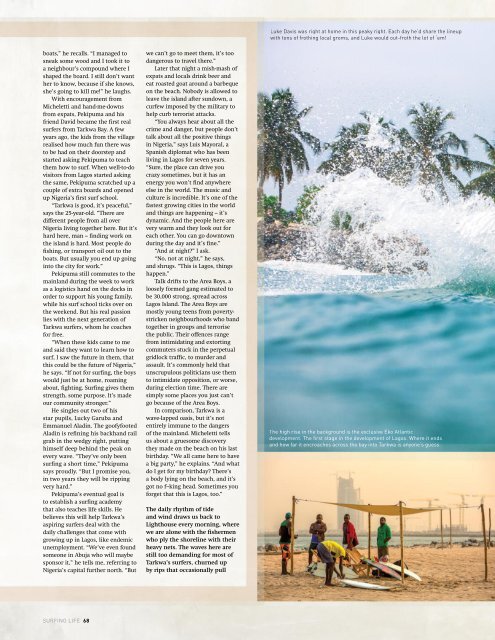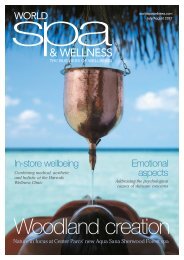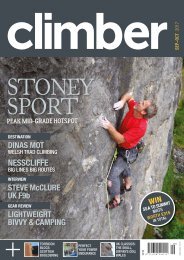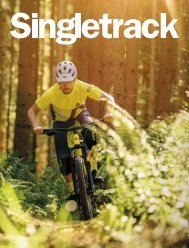Surfing Life 2017
- No tags were found...
Create successful ePaper yourself
Turn your PDF publications into a flip-book with our unique Google optimized e-Paper software.
Luke Davis was right at home in this peaky right. Each day he’d share the lineup<br />
with tons of frothing local groms, and Luke would out-froth the lot of ‘em!<br />
boats,” he recalls. “I managed to<br />
sneak some wood and I took it to<br />
a neighbour’s compound where I<br />
shaped the board. I still don’t want<br />
her to know, because if she knows,<br />
she’s going to kill me!” he laughs.<br />
With encouragement from<br />
Micheletti and hand-me-downs<br />
from expats, Pekipuma and his<br />
friend David became the first real<br />
surfers from Tarkwa Bay. A few<br />
years ago, the kids from the village<br />
realised how much fun there was<br />
to be had on their doorstep and<br />
started asking Pekipuma to teach<br />
them how to surf. When well-to-do<br />
visitors from Lagos started asking<br />
the same, Pekipuma scratched up a<br />
couple of extra boards and opened<br />
up Nigeria’s first surf school.<br />
“Tarkwa is good, it’s peaceful,”<br />
says the 25-year-old. “There are<br />
different people from all over<br />
Nigeria living together here. But it’s<br />
hard here, man – finding work on<br />
the island is hard. Most people do<br />
fishing, or transport oil out to the<br />
boats. But usually you end up going<br />
into the city for work.”<br />
Pekipuma still commutes to the<br />
mainland during the week to work<br />
as a logistics hand on the docks in<br />
order to support his young family,<br />
while his surf school ticks over on<br />
the weekend. But his real passion<br />
lies with the next generation of<br />
Tarkwa surfers, whom he coaches<br />
for free.<br />
“When these kids came to me<br />
and said they want to learn how to<br />
surf, I saw the future in them, that<br />
this could be the future of Nigeria,”<br />
he says. “If not for surfing, the boys<br />
would just be at home, roaming<br />
about, fighting. <strong>Surfing</strong> gives them<br />
strength, some purpose. It’s made<br />
our community stronger.”<br />
He singles out two of his<br />
star pupils, Lucky Garuba and<br />
Emmanuel Aladin. The goofyfooted<br />
Aladin is refining his backhand rail<br />
grab in the wedgy right, putting<br />
himself deep behind the peak on<br />
every wave. “They’ve only been<br />
surfing a short time,” Pekipuma<br />
says proudly. “But I promise you,<br />
in two years they will be ripping<br />
very hard.”<br />
Pekipuma’s eventual goal is<br />
to establish a surfing academy<br />
that also teaches life skills. He<br />
believes this will help Tarkwa’s<br />
aspiring surfers deal with the<br />
daily challenges that come with<br />
growing up in Lagos, like endemic<br />
unemployment. “We’ve even found<br />
someone in Abuja who will maybe<br />
sponsor it,” he tells me, referring to<br />
Nigeria’s capital further north. “But<br />
we can’t go to meet them, it’s too<br />
dangerous to travel there.”<br />
Later that night a mish-mash of<br />
expats and locals drink beer and<br />
eat roasted goat around a barbeque<br />
on the beach. Nobody is allowed to<br />
leave the island after sundown, a<br />
curfew imposed by the military to<br />
help curb terrorist attacks.<br />
“You always hear about all the<br />
crime and danger, but people don’t<br />
talk about all the positive things<br />
in Nigeria,” says Luis Mayoral, a<br />
Spanish diplomat who has been<br />
living in Lagos for seven years.<br />
“Sure, the place can drive you<br />
crazy sometimes, but it has an<br />
energy you won’t find anywhere<br />
else in the world. The music and<br />
culture is incredible. It’s one of the<br />
fastest growing cities in the world<br />
and things are happening – it’s<br />
dynamic. And the people here are<br />
very warm and they look out for<br />
each other. You can go downtown<br />
during the day and it’s fine.”<br />
“And at night?” I ask.<br />
“No, not at night,” he says,<br />
and shrugs. “This is Lagos, things<br />
happen.”<br />
Talk drifts to the Area Boys, a<br />
loosely formed gang estimated to<br />
be 30,000 strong, spread across<br />
Lagos Island. The Area Boys are<br />
mostly young teens from povertystricken<br />
neighbourhoods who band<br />
together in groups and terrorise<br />
the public. Their offences range<br />
from intimidating and extorting<br />
commuters stuck in the perpetual<br />
gridlock traffic, to murder and<br />
assault. It’s commonly held that<br />
unscrupulous politicians use them<br />
to intimidate opposition, or worse,<br />
during election time. There are<br />
simply some places you just can’t<br />
go because of the Area Boys.<br />
In comparison, Tarkwa is a<br />
wave-lapped oasis, but it’s not<br />
entirely immune to the dangers<br />
of the mainland. Micheletti tells<br />
us about a gruesome discovery<br />
they made on the beach on his last<br />
birthday. “We all came here to have<br />
a big party,” he explains. “And what<br />
do I get for my birthday? There’s<br />
a body lying on the beach, and it’s<br />
got no f--king head. Sometimes you<br />
forget that this is Lagos, too.”<br />
The daily rhythm of tide<br />
and wind draws us back to<br />
Lighthouse every morning, where<br />
we are alone with the fishermen<br />
who ply the shoreline with their<br />
heavy nets. The waves here are<br />
still too demanding for most of<br />
Tarkwa’s surfers, churned up<br />
by rips that occasionally pull<br />
The high rise in the background is the exclusive Eko Atlantic<br />
development. The first stage in the development of Lagos. Where it ends<br />
and how far it encroaches across the bay into Tarkwa is anyone’s guess.<br />
SURFING LIFE 68






